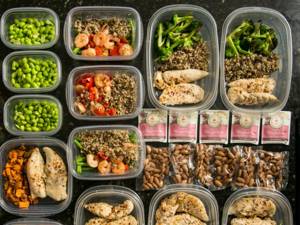Live » health
Mindvalley • June 29, 2021 9:18
In the field of popular literature on proper nutrition and weight loss, the belief has taken root that the more often you eat, the greater your chances of burning calories and controlling hunger. A diet of six or more meals or "mini-meals" each day has often been recommended as a more convenient approach to diet than eating three large meals. But science is advancing, and the answer to whether you should eat six or three times a day is no longer so clear-cut.
“Years ago, we all believed that you needed to eat several times a day to keep your metabolism going. You had to continue to “keep the fire burning and keep the stove burning.” New research shows that your metabolism doesn't slow down unless you eat several times a day , says New York-based nutritionist Martha McKittrick, who has been providing weight loss counseling for more than 20 years.
Many studies do indeed suggest that eating smaller, more frequent meals can reduce hunger. A study published in the Journal of the Academy of Nutrition and Dietetics (Chicago, USA), which included almost 2,700 women and men, found that those who ate at least six times a day consumed fewer calories, consumed healthier foods and had more health benefits. lower body mass index than those who ate fewer than four times in 24 hours. The study also showed that more frequent meals have positive effects on cholesterol and insulin levels. However, other studies have concluded that eating more frequently may not be optimal.
How many times a day should you eat?
Most articles devoted to weight loss advise eating 4-5 times a day, assuring that without following this rule it is impossible to get rid of excess weight. At the same time, the diet of “ordinary” people - eating 3 times a day - is automatically recognized as erroneous.
The second important point, which is mentioned almost everywhere, is when exactly to eat. You can often read or hear that in the morning the calories entering the body are burned, and in the evening (most often we are talking about meals after 18.00), on the contrary, they are stored in fat deposits.
In other words, in the morning you can eat a hearty meal and not worry about increasing the fat layer, and in the evening even a light salad turns into excess weight. It is believed that refusal to eat breakfast becomes the main enemy for those who want to remain or, conversely, acquire the desired slimness.
Meal frequency and effect on cholesterol, blood pressure, insulin in the body
There is much less literature in the scientific literature regarding the effects of changes in meal frequency on “health markers” such as blood lipids and glucose, blood pressure, hormone levels and cholesterol.
Gwinup et al were among the first to undertake several descriptive studies assessing the effects of eating like "herbivores" (frequent and low) versus "carnivores" (rare and high) in humans. Five hospitalized men and women were prescribed the consumption of isocaloric food for 14 days in a crossover method according to the following scheme:
- one large meal a day,
- 10 doses per day, every 2 hours,
- Three meals a day.
Eating like a carnivore (one meal per day) resulted in an increase in serum lipids compared to eating 3 times a day. Herbivore-type feeding (10 times per day) caused a decrease in serum lipids: phospholipids, esterified fatty acids and cholesterol.
Later, in studies involving obese and non-obese people, there was also a significant improvement in total cholesterol when isocaloric foods were consumed in 8 versus one meal and in 17 snacks versus 3 meals a day.
In a cross-sectional study that included 6,890 men and 7,776 women aged 45–75 years, in the general population, mean cholesterol concentrations decreased significantly with increasing meal frequency, even after adjusting for the confounding variables obesity, age, physical activity, and dietary intake. After adjusting for these variables, total and LDL cholesterol levels were about 5% lower in people who ate more than 6 times a day, compared with those who ate once or twice a day. Similar results were obtained by other researchers.
A recent cross-sectional study of the effects of meal frequency on health outcomes in humans compared traditional 3 meals a day (breakfast, lunch, and dinner) versus consuming all of these meals in one serving. Each test subject adhered to one of the nutritional plans for 8 weeks with an 11-week break. When eating once a day, there was also a significant increase in total blood pressure .
Scientists reported that increasing meal frequency has a positive effect on glucose tolerance. Specifically, when subjects consumed 4 small meals at 40-minute intervals, rather than one large meal containing exactly the same number of calories, lower insulin secretion and glucose levels were observed .
When comparing consumption of an isocaloric diet of 17 small meals per day (versus 3 per day), serum insulin levels were 27.9% lower.
However, there are several experiments involving healthy men, healthy women, and overweight women that did not show any benefits on cholesterol and triglycerides.
Although research on health markers such as total cholesterol, LDL cholesterol, and glucose tolerance has been mixed, increasing meal frequency appears to have a beneficial effect.
However, it is noted that the experiments that found the benefits of increasing meal frequency were relatively short-term, and nothing is known about whether similar positive adaptations would occur in a long-term study.
However, it is noted that the experiments that found the benefits of increasing meal frequency were relatively short-term, and nothing is known about whether similar positive adaptations would occur in a long-term study.
Is it possible to lose weight by giving up three meals a day?

Many studies have been conducted on this topic, which have proven that the total number of calories consumed is decisive, and not the frequency of meals. People prone to overeating should understand that with both three and five meals a day, they will eat a lot. Another important factor is what foods are consumed.
Food rich in fast carbohydrates leads to blood sugar rising, and after a short period of time falling again, that is, the feeling of hunger returns. Therefore, when eating sweets and flour products (not made from whole grains), a person quickly wants to have a snack again.
The influence of food frequency on metabolism
The ironclad argument “To speed up your metabolism, increase the frequency of your meals” implies that eating smaller meals increases your metabolism.
However, studies of meal frequency did not reveal a difference between fractional and standard meals. In only one case was it found that weight loss on a low-calorie diet also changed with changes in meal frequency. Based on the data obtained, the scientists concluded that the influence of meal frequency on body weight regulation is most likely possible, but at the expense of achieving a balance of calories (energy) consumed. In other words, there is no significant relationship between meal frequency and weight loss.
With a change in the frequency of food intake and while maintaining the number of calories consumed, the metabolic rate does not change, just as weight loss does not occur. And when you reduce the amount of calories consumed, your metabolic rate decreases slightly. At the same time, metabolism slows down not from changes in the frequency of food intake, but from a reduction in energy consumption.
However, this issue is controversial, as evidenced by another recently published study. In it, scientists, comparing 2 groups of men, one of which ate three times a day, and the second 14 for 36 hours, did not notice any differences in the metabolic rate, except that those who were on three meals a day had a slightly higher energy expenditure in the state peace.
What time should you eat?
Many weight loss materials say that morning meals are ideal for consuming any food. There is no scientific evidence that metabolism is higher in the morning than at other times of the day. Refusal or, conversely, a hearty breakfast does not affect the metabolic rate.
Intermittent fasting, which involves abstaining from food between noon and 8 p.m., is gaining popularity among those losing weight. This kind of nutrition has become fashionable for the simple reason that it allows you to not control the number of calories you eat, but creates a deficit for 16 hours, since that is how many hours a day you don’t eat.
How many times a day should you eat to lose weight?
conclusions
Research shows an indirect link between meal frequency and weight gain, suggesting that the only way to gain weight is by increasing the number of calories you consume. Lower meal frequency may be associated with lower BMI (while maintaining identical caloric intake) through exercise.
There is, however, too much evidence to suggest that meal frequency has no effect on metabolism. Metabolic speed and weight fluctuations cause completely different indicators and habits.
Hunger Control
People who are overweight usually cannot control the feeling of hunger. Such eating behavior is developed as a result of systematic violations. The body gets used to receiving a lot of simple calories and requires a new portion every few hours. The result of this is a hormonal imbalance.
A complete refusal of food cannot give an immediate effect. Metabolism begins to change only after three days, and such fasting is also not beneficial. To adjust your diet in favor of the right one, you need to monitor your own feeling of hunger. If it occurs within 2-3 hours after a meal, it means that the person eats too much sweets and bread, that is, empty calories, and not enough fiber, that is, vegetables.
Why does eating more frequently help you lose weight?

There is no scientific evidence for a specific number of meals per day that will help you lose weight, but there are some guidelines. If increasing the number of meals means cutting calories by eating smaller portions, this approach works. This happens due to the fact that a person begins to watch what he eats.
If you eat fast food containing 700-900 empty calories, then eating five meals a day will not bring any results. This also applies to snacking on pizza, half a cake with a cup of tea after an evening meal. Therefore, when it is possible to control calories only when the number of meals is increased, it is better to follow this path.
Eating before bed

Despite the fact that it is strictly not recommended to eat in the evening, if you still want to snack on something, it could be the following foods:
- So, half an hour before bedtime you can drink 200-300 ml of kefir. This meal will not harm your body at all, but on the contrary will help speed up your metabolism. This once again confirms the fact that it doesn’t matter at all what or how much a person should eat, but another nuance is what he eats and at what time of day this happens;
- You can also eat a few raw eggs or drink milk an hour or two before bed. This snack also won't leave many extra calories in your body;
- If you decide to go on a vegetable diet, then snacks such as carrots or cucumbers will not harm your digestive system.
In addition, you can choose any diet, but you must correctly calculate both your strength and the body’s resources. But, no matter what diet you choose, nutritionists recommend drinking plenty of water throughout the day. But, before going to bed, the amount of water should also be significantly reduced.
How many times a day should you eat to gain weight?
Most bodybuilders consume at least 30 grams of protein per meal. This approach is dictated by the fact that protein absorption decreases when it is present in excess in the diet. However, there is no upper limit to its consumption.
Those who want to gain weight are recommended to eat more often to increase their total daily caloric intake. Without this condition, it is impossible to achieve an increase in muscle mass. If you eat more often, you will have more calories. However, as with weight loss, the quality of food plays a role here, not the number of meals.
How many calories should you consume per day?
The answer to this question depends on the goal being pursued. If you want to lose weight, you need to eat no more than 1800-200 calories per day. This can be achieved with three meals a day, if one serving contains from 600 to 700 kcal. It should contain 70-80 grams of proper (complex) carbohydrates, 30 grams of protein and from 20 to 25 grams of fat.
To gain muscle mass, a man needs at least 2700-2900 kcal per day. This amount of calories can be achieved by eating five or six times a day, with most consumed at breakfast and lunch. The rest of the carbohydrates should be left for the meal after strength training.
Other facts
Eating frequently can be beneficial for maintaining muscle mass. When comparing the results of two groups of men eating 3 versus 14 times a day, the scientists found that, given the same number of calories consumed and no difference in metabolic rate, the group eating less protein-rich foods oxidized protein 17% faster than the group. with 14 meals a day. However, later the researchers came to the conclusion that with 4 meals a day, these differences disappear. And there is no difference in weight loss between consuming 80% casein protein per meal and consuming 25% DV of whey protein four times a day. Casein protein is superior to whey protein in terms of nitrogen retention time. Whey protein has higher protein oxidation and synthesis rates, but casein still provides more efficient nitrogen retention in muscle mass.
While it's theoretically possible that eating more meals could promote nitrogen retention, recent research has confirmed that eating protein on an empty stomach is more effective for building muscle. However, this can be combined by taking it on an empty stomach for slow absorption and as often as possible.
One of the above-mentioned studies emphasized that glycemic control with three meals a day is easier to achieve than with 14 meals a day. This was also confirmed when comparing 2 meals a day and 12 meals a day.
It has also been noted that three meals a day, relative to fractional ones (in particular, 14 meals a day), while maintaining the same daily calorie content, seems more satisfying and less likely to cause a feeling of hunger.











